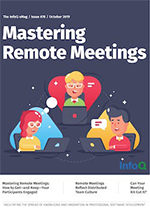SPONSOR AD  Modern messaging platforms help dev teams ship software and manage operations with greater speed and confidence. Read this guide to learn more about the challenges to effective DevOps collaboration, top reasons to adopt a modern messaging platform, and what to look for. Download Now. |
 In this podcast, Daniel Bryant sat down with Anurag Goel, founder and CEO of Render. Topics covered included: the evolution of cloud platforms; simplifying developer experience; running large-scale workloads on Kubernetes; and the future of tooling and platforms within the cloud native computing space. (Podcast) |
 In this podcast recorded at Agile 2019, Shane Hastie, Lead Editor for Culture & Methods, spoke to Caitlin Walker about clean language, anti-fragility and inclusiveness. (Podcast) |
| |
TOP AI, ML & Data Engineering NEWS HEADLINES |
-
|
 Jade Abbott discusses machine learning and the unexpected details of putting models in production besides just the code, model and infrastructure: DataOps, robustness and uncertainty tests, model drift, model testing approaches, model performance tracking, as well as specific tools and technologies that can help. (Presentation with transcript included)
The next QCon is QCon London, March 2-4, 2020. Join us! |
SPONSOR AD  With over 2000+ survey respondents, gain your insight into the landscape of database DevOps and see what trends, challenges, and opportunities are in store for 2020. Download now. |
| |
| |
TOP DevOps NEWS HEADLINES |
-
-
-
-
-
|
 Gareth Clay and Bella Bai introduce the features provided by these latest Spring Cloud products. (Presentation) |
| |
TOP Development NEWS HEADLINES |
-
|
 Molly Wright Steenson goes in-depth into one of the largest information networks of its day, the pneumatic tubes, and provides an interesting historical comparison to the development of modern digital networks - the challenges faced by constructing these networks, the limits of what could be sent through these networks and the impact they had on communication as a whole. (Presentation with transcript included) |
| |
 Java SE 14 (March 2020) introduces records (jep359) as a preview feature. Records aim to enhance the language's ability to model "plain data" aggregates with less ceremony. In this article Java Language Architect Brian Goetz takes a deep dive into the feature. (Article) |
 Sergey Kuksenko talks about the performance benefits inline types bring to Java and how to exploit them. Inline/value types are the key part of experimental project Valhalla, which should bring new abilities to the Java language. (Presentation with transcript included) |
| |
TOP Web Development NEWS HEADLINES |
-
-
-
-
|
 Kyle Cordes demos the creation of an Angular+Node+Nest+GraphQL project. (Presentation) |
| |
TOP Architecture & Design NEWS HEADLINES |
-
|
 Jonathan Bregler overviews the lessons learned while implementing a reactive relational database connectivity (R2DBC) driver for the SAP HANA database. (Presentation) |
 Chris Saunders, Kelly Walsh, Paul Beccio and Matthew Dosberg discuss the journey DHS-CIS took to move their system on Pivotal. (Presentation) |
 Thierry Cruanes covers the three pillars of the Snowflake architecture: separating compute and storage to leverage abundant cloud compute resources; building an ACID compliant database system on immutable storage; and delivering a scalable multi-tenant data warehouse system as a service. (Presentation with transcript included) |
| |
TOP Culture & Methods NEWS HEADLINES |
-
-
|
 The book Managing the Unmanageable by Mickey W. Mantle and Ron Lichty provides rules, tools, and insights to manage programmers and teams. It explores how to hire and develop programmers, onboard new hires quickly and successfully, and build and nurture highly effective and productive teams. (Article) |
 In the book Remote Mob Programming: At home, but not alone, Simon Harrer, Jochen Christ, and Martin Huber share their experience doing mob programming while working from home for over a year.(Article) |
 Adopting a virtual office model saves a business $11,000+ annually per employee. It’s also one of the best answers to employees’ growing demands for mobility. Whether you’re considering a virtual office environment for several employees or a whole team, implement these strategies to ensure managers’ peace of mind and the top productivity of remote workers. (Article) |
 Dave Rooney examines the two key principles -NoEstimates, NoProcesses- common to all successful software delivery approaches and builds out based on the experience of the participants. (Presentation) |
 Ralph van Roosmalen discusses agile management, self-organizing teams, and organizations without managers. (Presentation) |
 Liz Keogh looks at some different strategies for approaching complex ecosystems, starting from status quo, and allowing innovation to emerge through obliquity, naivety, and serendipity. (Presentation) |
 Heather Conklin, David Kaiser examine the benefits of mutation testing, with real-world examples of what happened with apparently well-covered code put through the process. (Presentation) |
 Ben Hartshorne describes the transformation that Honeycomb went through, when they dropped build times by 40% and gave themselves the ability to track build times and asset sizes over time. Hartshorne covers the techniques one can use to accomplish the same goals in different environments. (Presentation with transcript included) |

























